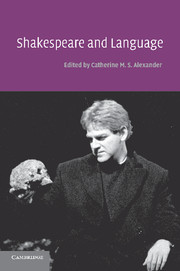Book contents
- Frontmatter
- Contents
- List of contributors
- Editor's note
- 1 Shakespeare and language: an introduction
- 2 Shakespeare's language and the language of Shakespeare's time
- 3 The foundations of Elizabethan language
- 4 Shakespeare's talking animals
- 5 Some functions of Shakespearian word-formation
- 6 Shakespeare and the tune of the time
- 7 Shakespeare's Romeo and Juliet: the places of invention
- 8 Shakespeare's thematic modes of speech: Richard II to Henry V
- 9 Hamlet and the power of words
- 10 The art of the comic duologue in three plays by Shakespeare
- 11 Hamlet's ear
- 12 ‘Voice potential’: language and symbolic capital in Othello
- 13 The aesthetics of mutilation in Titus Andronicus
- 14 ‘Time for such a word’: verbal echoing in Macbeth
- 15 Household words: Macbeth and the failure of spectacle
- 16 Late Shakespeare: style and the sexes
- Index
- References
1 - Shakespeare and language: an introduction
Published online by Cambridge University Press: 15 December 2009
- Frontmatter
- Contents
- List of contributors
- Editor's note
- 1 Shakespeare and language: an introduction
- 2 Shakespeare's language and the language of Shakespeare's time
- 3 The foundations of Elizabethan language
- 4 Shakespeare's talking animals
- 5 Some functions of Shakespearian word-formation
- 6 Shakespeare and the tune of the time
- 7 Shakespeare's Romeo and Juliet: the places of invention
- 8 Shakespeare's thematic modes of speech: Richard II to Henry V
- 9 Hamlet and the power of words
- 10 The art of the comic duologue in three plays by Shakespeare
- 11 Hamlet's ear
- 12 ‘Voice potential’: language and symbolic capital in Othello
- 13 The aesthetics of mutilation in Titus Andronicus
- 14 ‘Time for such a word’: verbal echoing in Macbeth
- 15 Household words: Macbeth and the failure of spectacle
- 16 Late Shakespeare: style and the sexes
- Index
- References
Summary
TONGUE
In ‘Shakespeare's talking animals’, Terence Hawkes makes a fundamental claim about language and Shakespeare's work. The plays, he says, contain ‘ideas about language’ which we neglect ‘because we are anaethetized to them by our own literacy’ (Hawkes: p. 69, this volume). Nothing could be more important in seeking to understand Early Modern ideas about language and use of language than becoming aware of our own narcotic unawareness of them. We are used to historicizing Shakespeare in every respect except his language, and, as Hawkes implies, our ignorance is matched only by our ignorance of our ignorance. But I would go further than Hawkes: as I will try to show in this introduction, there are not only ideas about language we miss; there are usages of language we misinterpret because we mistake the nature of language in the Early Modern period.
From the point of view of linguistics, and taken as a product of human cognition, language can be assumed to be the same thing in all cultures, and at all times in attested human history. However, taken as a cultural entity, within literary or cultural criticism, language changes radically between the Early Modern period and our own – as radically as other cultural entities such as government, religion, and duty change. In the first part of this introduction, I will try to make language strange, to give an idea of its different cultural status in the Early Modern period; in the second, I will examine the curious reality our culture has bestowed on ‘wordes’, and what this does to our readings of Shakespeare.
Information
- Type
- Chapter
- Information
- Shakespeare and Language , pp. 1 - 17Publisher: Cambridge University PressPrint publication year: 2004
References
Accessibility standard: Unknown
Why this information is here
This section outlines the accessibility features of this content - including support for screen readers, full keyboard navigation and high-contrast display options. This may not be relevant for you.Accessibility Information
- 3
- Cited by
